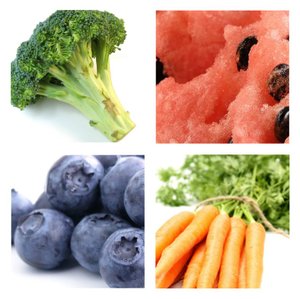Healthy Eating During Pregnancy
| Share: | Tweet | Thank You! |
 When you are pregnant you must provide good nutrition for two, in quality not quantity! Your growing baby gets all its nourishment for you, so if you are lacking vitamins, minerals and other nutrients, your baby will likely be lacking as well.
When you are pregnant you must provide good nutrition for two, in quality not quantity! Your growing baby gets all its nourishment for you, so if you are lacking vitamins, minerals and other nutrients, your baby will likely be lacking as well.How many extra calories do I need during pregnancy?
You need about 300 extra calories per day, especially later in your pregnancy when your baby is growing quickly, those calories should come from nutritious foods so they can contribute to your baby's growth and development. This means an extra two or three servings from any of the food groups each day. Breastfeeding women need approximately 900 extra calories per day.What foods should I eat during my pregnancy?
Variety is key to a well-balanced diet. Be sure to get foods from all the food groups: dairy products, fruits & vegetables, meat & alternatives (meat, fish, eggs, nuts), fats, grains and plenty of water. Not only should you be sure to get something from every food group each day, but you should vary the foods you do eat from each group. This ensures you are getting all the vitamins and minerals you and your growing baby needs.How much should I eat?
A well-balanced diet during pregnancy should contain these approximate amounts:| Approx. Servings/Day | 1 Serving Equals | Food Suggestions | |
| Meat & Alternatives | 3 servings | 2-3 ounces | fish, poultry, lean meat, eggs, beans, lentils, seeds and nuts or nut butters (i.e. peanut, almond, cashew, tahini, soy nut) |
| Dairy & Alternatives | 4 servings | 1 cup or equivalent | milk, soy milk, 1 ounce of cheese, 1 cup yogurt, or 1 1/2 cups of cottage cheese |
| Fruits & Vegetables | 7-8 servings | 1/2 cup |
Rich in Vitamin C (broccoli, cauliflower, green peppers, spinach, potato, watermelon, cantaloupe, lemon, oranges, strawberry, papaya, honeydew melon) Rich in Beta Carotene (cabbage, carrots, sweet potato, winter squash, broccoli, nectarine, cantaloupe, apricot, watermelon, peach) |
| Eat at least one dark green and one orange vegetable each day. Choose vegetables and fruit prepared with little or no added fat, sugar or salt. Again, the best way to ensure you are getting the broadest spectrum of vitamins and minerals is to vary the fruits and vegetables you are eating each day. | |||
| Grains, Dried beans, Peas, Legumes | 6-11 servings | see suggestions | 1 serving equals one slice of bread or 1/2 bagel, 1/2 cup pasta, or 1/4 cup cooked dried beans, peas, or legumes. 1 serving of dry cereal measures 3/4 cup, cooked cereal measures 1/2 cup. |
| When choosing your breads and grains, try to buy whole grain versions the majority of the time. | |||
| Oils & Fats | 2-3 servings | 1 Tablespoon | For good health, include a small amount of unsaturated fat and limit the amount of saturated and trans fat in your diet. Unsaturated vegetable oils include Canola, Corn, Flaxseed, Olive, Peanut, Soybean, Sunflower. Limit butter, hard margarine, lard and shortening. |
Gaining too much weight? Try snacking on fruits and vegetables instead of cookies, chocolate and chips. Not only are they filled with vitamins and minerals, but they will satisfy your hunger while keeping your weight in check.
If you had trouble maintaining your weight prior to pregnancy (underweight/overweight) it is a good idea to consult with your doctor or nutritional counsellor to help you build a proper nutritional plan to ensure you are eating well and maintaining a healthy body weight during your pregnancy. Gaining too much, or too little weight can have negative effects on your baby, your body and your delivery.
| Share: | Tweet | Thank You! |


 Community
Community





